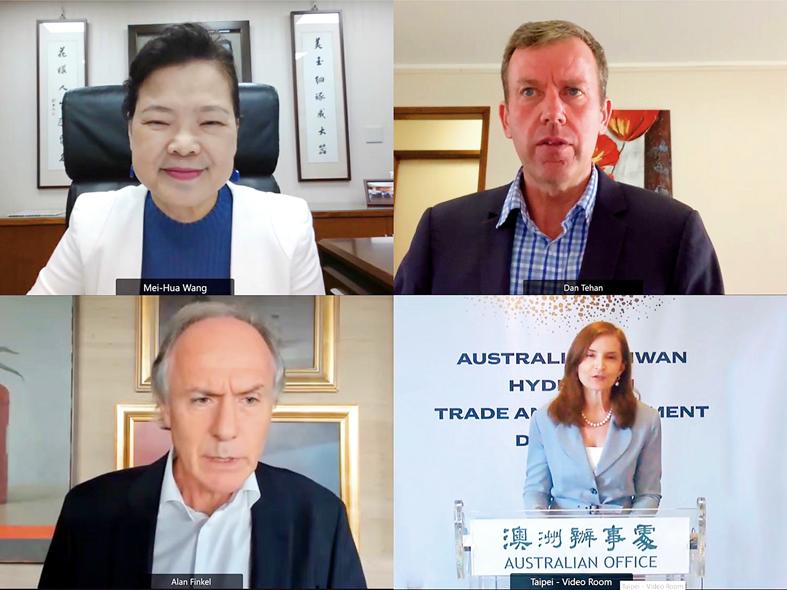Taiwan and Australia yesterday discussed opportunities for bilateral cooperation on clean energy, including on the development of hydrogen-based technologies, and agreed to expand their trade and investment efforts in such fields.
The talks, held as part of the bilateral Hydrogen Trade and Investment Dialogue, also included strategies for increasing renewable energy, said the Australian Office in Taipei, which hosted the videoconference.
In the past few years, cooperation between Taiwan and Australia has expanded to offshore wind energy, and Taiwan plans to make a greater push for partnerships with other nations on the application and development of hydrogen energy, Minister of Economic Affairs Wang Mei-hua (王美花) told the forum.

Photo courtesy of the Australian Office Taipei
Describing Taiwan and Australia as “important partners in energy,” Wang said that 27 percent of Taiwan’s liquefied natural gas and 70 percent of its coal comes from Australia.
The partnership does not end with traditional energy resources, Wang said.
“Taiwan’s first offshore wind farm was built in collaboration with Australia’s Macquarie Group,” she said. “We hope to keep working together as Taiwan increases its renewable energy efforts.”
Australia is an important exporter of energy, minerals and agricultural products to Taiwan, while Taiwan exports high-tech products to Australia.
Over the past five years, trade has grown at an average of 10 percent per year, while bilateral investment has grown at an average of 13 percent per year, the Ministry of Economic Affairs said.
Australia is Taiwan’s largest source for energy-related products, and Taiwan is Australia’s fourth-largest market for energy.
However, as the countries try to decarbonize, the talks also centered around trade and investment cooperation, including in wind and solar power, and in “emerging low-emission technologies such as hydrogen,” the Australian Office said in a statement.
The Australian delegation at the forum was led by Australian Minister for Trade, Tourism and Investment Dan Tehan and Special Adviser on Low Emissions Technology Alan Finkel, who gave the keynote address at the event on the challenges and opportunities of hydrogen.
“Australia and Taiwan are natural energy partners and are in a strong position to maximize these opportunities, as the world moves toward a net-zero emissions future,” the office said.
The dialogue is a continuation of the Joint Energy and Minerals, Trade and Investment Cooperation consultations, with the common goal of fostering a multilevel relationship between Taiwan and Australia in energy, the ministry said.

‘SWASTICAR’: Tesla CEO Elon Musk’s close association with Donald Trump has prompted opponents to brand him a ‘Nazi’ and resulted in a dramatic drop in sales Demonstrators descended on Tesla Inc dealerships across the US, and in Europe and Canada on Saturday to protest company chief Elon Musk, who has amassed extraordinary power as a top adviser to US President Donald Trump. Waving signs with messages such as “Musk is stealing our money” and “Reclaim our country,” the protests largely took place peacefully following fiery episodes of vandalism on Tesla vehicles, dealerships and other facilities in recent weeks that US officials have denounced as terrorism. Hundreds rallied on Saturday outside the Tesla dealership in Manhattan. Some blasted Musk, the world’s richest man, while others demanded the shuttering of his

TIGHT-LIPPED: UMC said it had no merger plans at the moment, after Nikkei Asia reported that the firm and GlobalFoundries were considering restarting merger talks United Microelectronics Corp (UMC, 聯電), the world’s No. 4 contract chipmaker, yesterday launched a new US$5 billion 12-inch chip factory in Singapore as part of its latest effort to diversify its manufacturing footprint amid growing geopolitical risks. The new factory, adjacent to UMC’s existing Singapore fab in the Pasir Res Wafer Fab Park, is scheduled to enter volume production next year, utilizing mature 22-nanometer and 28-nanometer process technologies, UMC said in a statement. The company plans to invest US$5 billion during the first phase of the new fab, which would have an installed capacity of 30,000 12-inch wafers per month, it said. The

MULTIFACETED: A task force has analyzed possible scenarios and created responses to assist domestic industries in dealing with US tariffs, the economics minister said The Executive Yuan is tomorrow to announce countermeasures to US President Donald Trump’s planned reciprocal tariffs, although the details of the plan would not be made public until Monday next week, Minister of Economic Affairs J.W. Kuo (郭智輝) said yesterday. The Cabinet established an economic and trade task force in November last year to deal with US trade and tariff related issues, Kuo told reporters outside the legislature in Taipei. The task force has been analyzing and evaluating all kinds of scenarios to identify suitable responses and determine how best to assist domestic industries in managing the effects of Trump’s tariffs, he

Taiwan’s official purchasing managers’ index (PMI) last month rose 0.2 percentage points to 54.2, in a second consecutive month of expansion, thanks to front-loading demand intended to avoid potential US tariff hikes, the Chung-Hua Institution for Economic Research (CIER, 中華經濟研究院) said yesterday. While short-term demand appeared robust, uncertainties rose due to US President Donald Trump’s unpredictable trade policy, CIER president Lien Hsien-ming (連賢明) told a news conference in Taipei. Taiwan’s economy this year would be characterized by high-level fluctuations and the volatility would be wilder than most expect, Lien said Demand for electronics, particularly semiconductors, continues to benefit from US technology giants’ effort